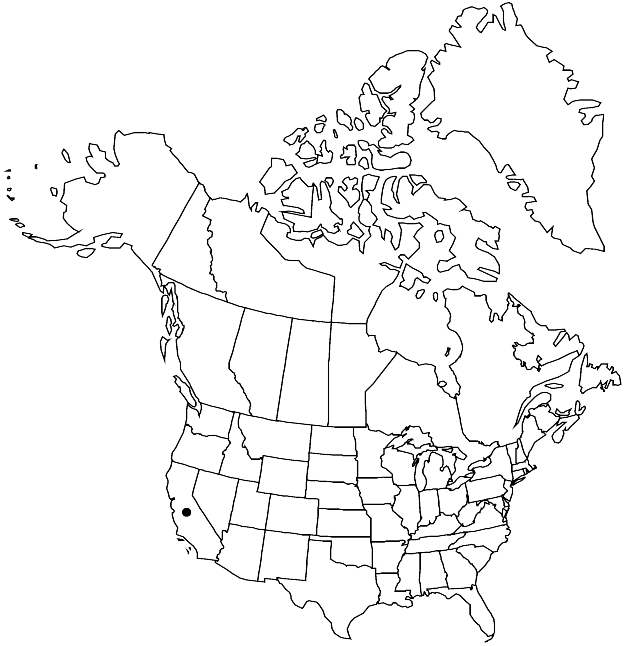Difference between revisions of "Streptanthus insignis subsp. lyonii"
Madroño 30: 234, fig. 3. 1983.
FNA>Volume Importer |
imported>Volume Importer |
||
| (6 intermediate revisions by 2 users not shown) | |||
| Line 6: | Line 6: | ||
|place=30: 234, fig. 3. 1983 | |place=30: 234, fig. 3. 1983 | ||
|year=1983 | |year=1983 | ||
| + | }} | ||
| + | |special_status={{Treatment/ID/Special_status | ||
| + | |code=E | ||
| + | |label=Endemic | ||
| + | }}{{Treatment/ID/Special_status | ||
| + | |code=C | ||
| + | |label=Conservation concern | ||
}} | }} | ||
|basionyms= | |basionyms= | ||
| Line 25: | Line 32: | ||
|discussion=<p>Of conservation concern.</p><!-- | |discussion=<p>Of conservation concern.</p><!-- | ||
--><p>Subspecies lyonii is known from Merced County.</p><!-- | --><p>Subspecies lyonii is known from Merced County.</p><!-- | ||
| − | --><p>Kruckeberg and Morrison described subsp. lyonii based on plants with an exclusively greenish yellow terminal cluster of sterile flowers, and discussed a sympatric form with greenish yellow sepals and a purple terminal cluster as a ‘bicolor’ form. Subsequent collections show that plants with only a greenish yellow terminal sterile cluster are absent in some years, and the ‘bicolor’ form is here included in subsp. lyonii.</p> | + | --><p>Kruckeberg and Morrison described <i></i>subsp.<i> lyonii</i> based on plants with an exclusively greenish yellow terminal cluster of sterile flowers, and discussed a sympatric form with greenish yellow sepals and a purple terminal cluster as a ‘bicolor’ form. Subsequent collections show that plants with only a greenish yellow terminal sterile cluster are absent in some years, and the ‘bicolor’ form is here included in <i></i>subsp.<i> lyonii</i>.</p> |
|tables= | |tables= | ||
|references= | |references= | ||
| Line 34: | Line 41: | ||
-->{{#Taxon: | -->{{#Taxon: | ||
name=Streptanthus insignis subsp. lyonii | name=Streptanthus insignis subsp. lyonii | ||
| − | |||
|authority=Kruckeberg & J. L. Morrison | |authority=Kruckeberg & J. L. Morrison | ||
|rank=subspecies | |rank=subspecies | ||
| Line 48: | Line 54: | ||
|publication title=Madroño | |publication title=Madroño | ||
|publication year=1983 | |publication year=1983 | ||
| − | |special status= | + | |special status=Endemic;Conservation concern |
| − | |source xml=https:// | + | |source xml=https://bitbucket.org/aafc-mbb/fna-data-curation/src/2e0870ddd59836b60bcf96646a41e87ea5a5943a/coarse_grained_fna_xml/V7/V7_1247.xml |
|tribe=Brassicaceae tribe Thelypodieae | |tribe=Brassicaceae tribe Thelypodieae | ||
|genus=Streptanthus | |genus=Streptanthus | ||
Latest revision as of 22:31, 5 November 2020
Racemes: terminal cluster of sterile flowers pale yellow or purplish. Flowers: sepals of fertile ones greenish yellow or purplish; petals lemon yellow or yellowish white. Fruit valves moderately to densely hispid. 2n = 28.
Phenology: Flowering Apr–May.
Habitat: Serpen- tine outcrops in arid grassland, oak woodland
Elevation: 200-900 m
Discussion
Of conservation concern.
Subspecies lyonii is known from Merced County.
Kruckeberg and Morrison described subsp. lyonii based on plants with an exclusively greenish yellow terminal cluster of sterile flowers, and discussed a sympatric form with greenish yellow sepals and a purple terminal cluster as a ‘bicolor’ form. Subsequent collections show that plants with only a greenish yellow terminal sterile cluster are absent in some years, and the ‘bicolor’ form is here included in subsp. lyonii.
Selected References
None.
